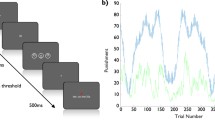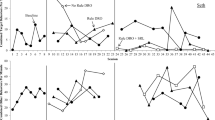Abstract
On the basis of Landahl's theory of two-choice learning it is shown that application of punishment for wrong responses, without giving award for correct ones, does not lead to complete learning, no matter how many trials are used. If initially a “wrong response” was learned, then an attempt to inhibit it by punishment alone will in a class of cases lead only to a 50% suppression of that wrong response. Possible connection with the problem of effectiveness of punishment as a deterrent for crime is mentioned.
Similar content being viewed by others
Literature
Landahl, H. D. 1941. “Studies in the Mathematical Biophysics of Discrimination and Conditioning I.”Bull. Math. Biophysics,3, 13–26.
Rapoport, A. 1965. “A Note on Equivalent Mathematical Models.”Ibid., Special Issue,27, 161–175.
Rashevsky, N. 1960.Mathematical Biophysics, Vol. II Chapter XIV. Third Edition. New York: Dover Publications, Inc.
Author information
Authors and Affiliations
Rights and permissions
About this article
Cite this article
Rashevsky, N. Reward and punishment in learning with possible reference to punishment for crime. Bulletin of Mathematical Biophysics 28, 477–481 (1966). https://doi.org/10.1007/BF02476827
Received:
Issue Date:
DOI: https://doi.org/10.1007/BF02476827




